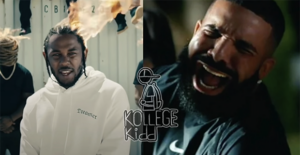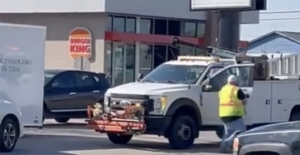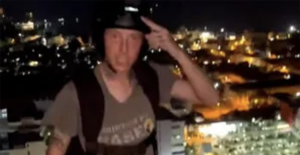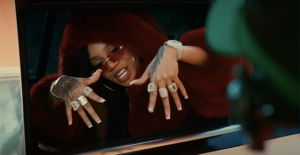
Chief Keef is regarded as one of Hip Hop’s most attention-grabbing artists not seen in a long time.
Sosa was the focus in Noisey’s debut episode of ‘Chiraq,’ an eight-part documentary series chronicling Chicago’s burgeoning Hip Hop scene and the impoverished and crime ridden Englewood neighborhood.
Thomas Morton of Noisey made an attempt in episode one to interview Sosa, but the teen rapper was headed to juvenile detention.
The Interscope artist was sentenced to 60 Days in the Illinois Youth Center in January 2013 for violating his probation. Chief Keef was placed on an 18-month probation for pointing a loaded handgun at a Chicago police officer in 2011.
Judge Carl Anthony Walker ordered Chief Keef into custody for his role in operating a firearm during an interview with Pitchfork Media in June 2012. In the video, Chief Keef, whose real name is Keith Cozart, can be seen shooting the weapon inside the gun range.

Morton instead was able to catch up with Young Chop, Sosa’s number one go to producer instrumental in the crafting the viral hit song “I Don’t Like.”
Chop explained the origins of “Drill” music to Morton.
“At first, it was called dead music cause everything they talking about, they shooting guns,” Chop explained. “People dying everyday. It’s just real life, that’s how people related to it.”
“Before the drill music, it was drill,” he continued. “Everything was a drill.”

Chop and Sosa became friends after connecting via social media.
“He actually hit me up on Facebook one day,” Chop said. “Then I went over there to his grandmom house. And then we did “3Hunna.” That’s when the fan base started coming and everything, like real big.”
Morton touched on Sosa’s rivalry with opposing rapper Lil JoJo. Morton went onto probe whether social media played a factor in the “3HunnaK” rapper’s death.
Leo Schmitz, deputy chief of Chicago’s 7th district police department, agreed to an interview with Morton and discussed social media’s impact on gangs.
“Social media, absolutely is where people are going now and it’s become a problem for us,” Schmitz said. “Where they used to mark up corners and things with spray paint and murals, now they’re doing a lot of that on the social media. A lot of that’s going there and that’s what’s moving people where crime is being committed.”

Michael Pfleger, pastor of St. Sabina Church in South Side, Chicago, expounded upon Schmitz’ claims.
“A whole lot of the gang stuff that goes on right now in the Chicago area…is what starts on rap and on YouTube,” he said. “The social media becomes the one that puts it out there, begins it, then it’s carried out in the street.”
Pfleger says Sosa’s multimillion-dollar record deal prompted other kids to want to achieve his level of success.
“They take a kid from Englewood who’s talking this gang warfare mentality, the whole him and Lil JoJo and the rest, the BDK, and all this kinda stuff and keep this up and look what happens,” he continued. “Now, all of a sudden, hundreds of other kids who wanna be rappers and make money.
“They say ‘Wow, look what happened to Chief Keef, he got all this money. He’s going to this mansion in Northbrook. He’s down in California. So how evil can I get in my rapping? How gangster can I get in my Hip Hop?’”

Peeda Pan, manager of Glory Boyz Entertainment, stood by Chief Keef amid the entire negative backlash the “Bang 3” rapper faced in 2013. Pan agreed to an interview during Sosa’s incarceration in juvenile detention.
“It’s just always some controversy, some type of curve ball getting thrown into the equation. Today he got sentenced to two months. He gotta sit down for a couple months,” Pan said. ”I think that overall, you gotta see the blessing in everything. He’s a kid, he’s growing up on camera in front of everybody, the internet and just in front of people’s eyes.

“The reason why this has become so big is because it came at a time when the music game needed something organic,” he continued. “I think that when people were seeing those videos, they can see the authenticity behind the s**t. This is the real deal it’s nothing fabricated about this. Especially for Keef at the time, being 15 years old and you’re looking at the videos and you’re seeing all kinds of n****s with guns and weed smoking and the s**t was just like ‘damn.’ Especially for people who have nothing to do with that kind of lifestyle. That really took a lot of people by…they just fed into it.”
Pan said there’s no telling what Sosa’s fate would’ve been if he had not been signed, citing the O’Block native’s rough upbringing.
“A neighborhood where Keef’s from Washington Park, that whole area, is rough. What you’re seeing, what you’re witnessing. You’re seeing someone trying to break out of a cage,” he explained. “You have to best… there’s nothing else when you’re coming from a situation like that other than I’ma sell drugs, I’ma get big in the dope game.
“There’s a lot of going on here. It’s only happening here. I think you can only get a Chief Keef from Chicago.”
For Updates, Be sure to Follow kollegekidd.com on Twitter @KollegeKidd by clicking here.
You can also stay up-to-date by liking kollegekidd.com FaceBook Page by clicking here





